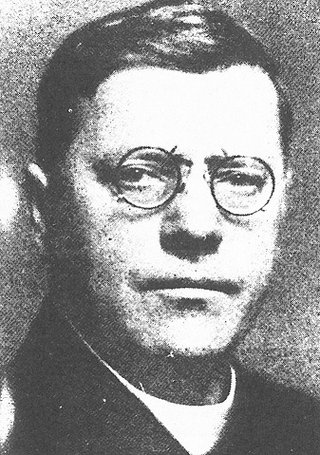Josef Anton Geiger

Personalia
Born:
Died:
Profession:
Persecution:
Imprisonment 03.12.1939 - February 1941,
Gau ban
Memberships
Curriculum Vitae
Josef Anton Geiger came from a family of mountain farmers. He initially attended the Vinzentinum episcopal boys' seminary in Brixen and transferred to the Franciscan grammar school in Hall/Tyrol, where he joined the Sternkorona Hall in 1898.
After graduating from high school in 1899, he returned to Brixen and entered the seminary there. After completing his theological studies, he was ordained a priest in 1903. In the same year, he joined the student fraternity Vindelicia. He works as a cooperator in Fliess and Zirl. From 1909, he worked as parish provost of the newly established branch in Karrösten in the Überinntal valley (near Imst) until his arrest in 1939 - with an interruption when he served in the First World War 1916-1918 as an imperial and royal field curate in the Tyrolean army.
Until 1938, he was also politically active as a board member of the Oberinntal Farmers' Association, as a substitute member of the Tyrolean provincial parliament, where he stood in for the incapacitated governor Dr. Franz Stumpf, and from 1934 to 1938 as local leader of the VF and as a member of the Federal Economic Council in Vienna.
After the Anschluss, he was removed from all political functions and was monitored and persecuted in a special way because of his earlier activities. When the Gestapo discovered records of the desecration of the cross by the Nazis during house searches, he was banned from working as a religious teacher.
On March 8, 1940, Josef Anton Geiger is sentenced to eighteen months in prison by the special court in Innsbruck on the basis of the indictment of February 29, 1940 - the Hitler oak is no longer mentioned here - "for radio crimes" because he listened to foreign stations, such as Radio Vatican and the Swiss station Beromünster, with a radio belonging to his sister between September and the end of November 1939. According to the court, this was not a "minor case", "as Geiger did not act out of curiosity so much as out of mistrust in the veracity of the reports of the Supreme Army Command." During the house search, a piece of paper with the broadcast data was found. After serving 13 months in the police prison in Innsbruck and in the prison in Garsten/OÖ [Gau Oberdonau] with one reinforced fasting day a week with bread and water, he was released in February 1941 and transferred to the Gau. He had to leave Tyrol and took up the position of chaplain in the Waldesruh sisters' home in Brückenau [since 1970: Bad Brückenau] in the Bavarian Rhön in the Lower Franconian district of Bad Kissingen at the beginning of 1941. Here, too, he continued to be "looked after" by the Gestapo - according to his own statements.
I have loved justice and hated injustice; therefore I die in exile.
Places
Place of activity:
Honoring:
Citations
Krause, Peter/Reinelt, Herbert/Schmitt, Helmut (2020): Farbe tragen, Farbe bekennen. Katholische Korporierte in Widerstand und Verfolgung. Teil 2. Kuhl, Manfred (ÖVfStG, Wien) S. 85/86.
